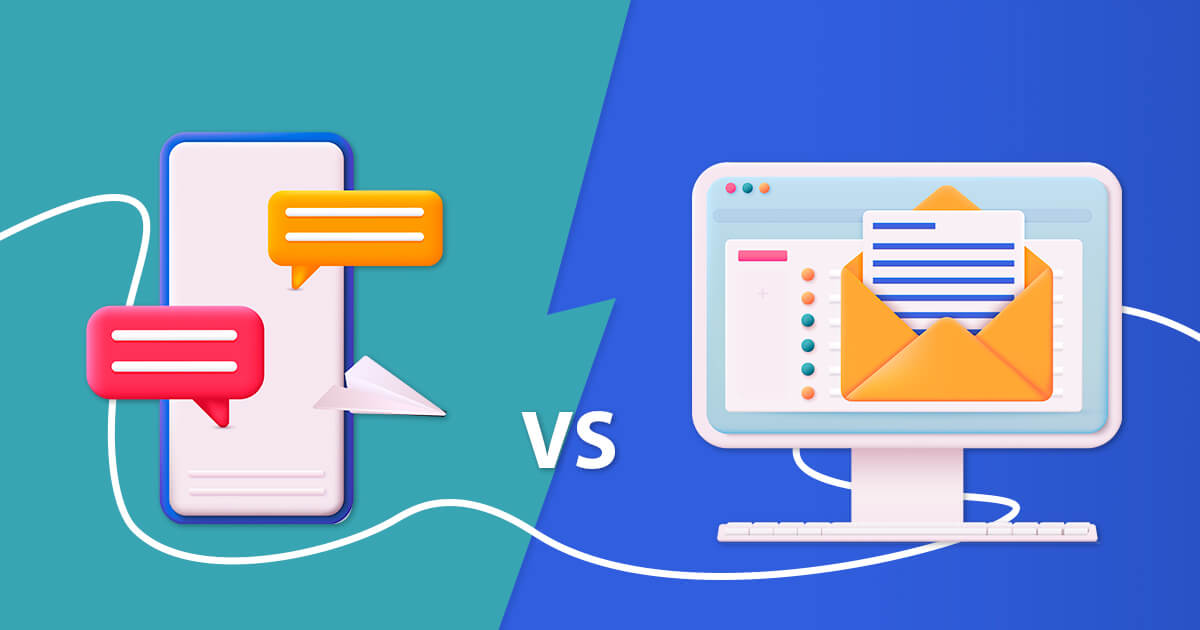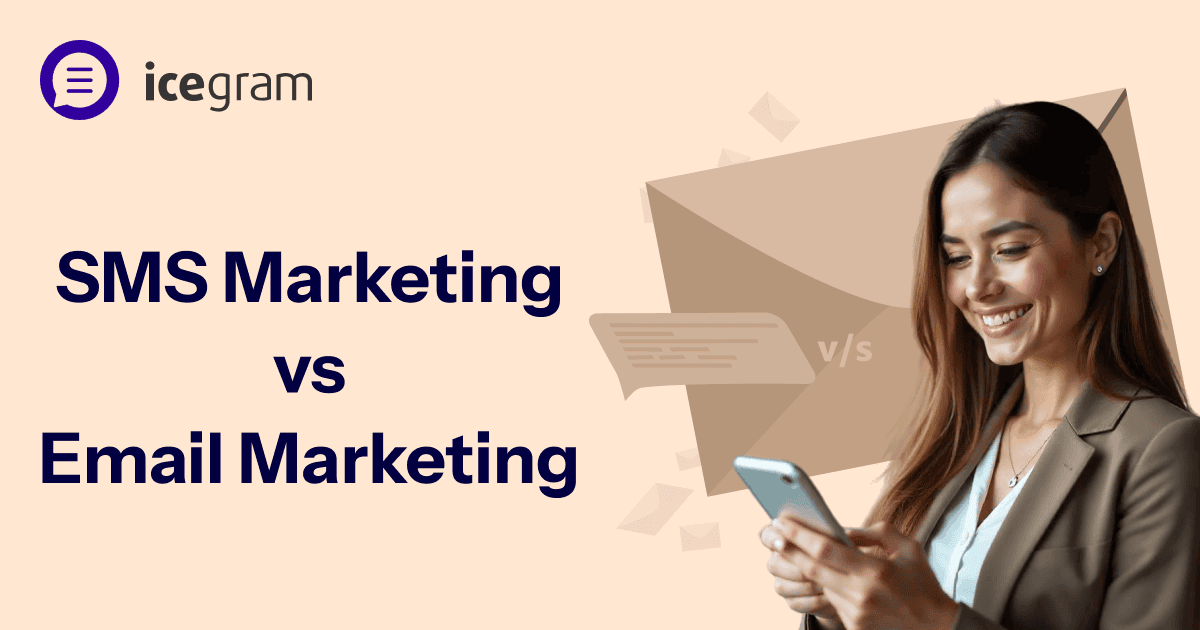Thinking of knocking on your customer’s door to make sales?
The current age has some smart ways for you to do so!
SMS marketing vs email marketing are two of the most contrasting marketing mediums.
In simple terms, SMS marketing is a form of marketing in which businesses send customer promotions through text messages. It is also known as text marketing.
On the other hand, email marketing refers to utilizing emails to distribute one’s message to a group of recipients who are your audience.
While both are promising in reaching out to your target audience, what sets both apart from each other?
So let’s check out more on that in the points to follow:
SMS marketing vs Email marketing

Here are some of the factors that differentiate both modes of marketing – SMS marketing vs email marketing:
Light on the pocket
SMS marketing is slightly more costly than email marketing. The costs depend on factors such as international locations, the number of messages, frequency, and others.
For emails, you generally have to pay a subscription fee for an email marketing platform.
A plugin such as Icegram Express can help you be rest assured, while it handles all your email marketing tasks in a breeze.
If you are not using a tool, then the process can be completely free of cost. Though there will be monthly limits with these platforms, you need not pay for each email, like in an SMS.
Better reach
Since SMS is an immediate mode of communication, it is delivered and read immediately, which leads to prompt communication.
On the other hand, emails are rather suited for newsletters and extended email marketing campaigns that can run for a relatively longer period.
Needless to say, these emails can also be tracked to gauge the effectiveness of the campaigns.
As per Statista, 61% of marketers still rely on email marketing for their communication. This speaks for itself.
Moreover, emails are less intrusive, which means they can read them at any time they want. Further, it has less possibility to interrupt your audience while they are busy in other tasks.
Ideal audience
SMS reaches the audience’s mobile phones which they can check more frequently. Email marketing is for brands who want to build and nurture a long-term relationship with their customers.
Emails allow you to speak to your audience directly. Moreover, you can also follow up with them through the same email sequence, making it seem like a human conversation.
While email subscribers can unsubscribe from an email if they wish to, an SMS audience doesn’t have that choice. This leads to an added layer of flexibility.
Customization
Both SMS and emails in diverse ways. For example, an SMS can be customized based on a customer’s location, preference, purchase history and other criteria.
To ensure that they have hit the target, marketers can use specific keywords, URLs and tracking codes to measure the effectiveness of the campaign.
As for emails, they can be customized for a lot more. This includes the customer’s name, company and other specific information.
More customization can be done based on the audience’s location, purchase history and other criteria. Besides these factors, A/B testing can be used to optimize emails for maximum engagement.
This increases the possibility of striking the right chord with the audience, allowing marketers to go the extra mile to build a strong relationship with their audience.
Email marketing also helps you take a detailed look at metrics such as open rate, bounce rate, conversion rate and unsubscribe rate, to gauge the results of your campaigns.
Emails also allow you to craft appealing messages with layouts, fonts and colors to grab attention.
Content length
SMS includes only short-form content (limited to 160 characters), while emails allow you to talk about a subject in more detail.
While SMS uses only the textual format, emails continue to support a variety of other interactive elements.
To add to that, you can also add an extra layer of visual content which includes videos, GIFs, infographics, video links, testimonials, animations, website links and a lot more.
This makes email a way versatile mode to give a better scope for multiple content formats. This means more words to get the point across and more possibilities for adding value.
Hence, leading to an increased scope for conversions manifold.
Segmentation & personalization
Kate and Stacey have been friends for a decade now.
Yet Kate might not like what Stacey does.
The same goes for multiple audience segments!
Regardless of how long they’ve been with your brand, customers could be on different customer journeys.
Emails are a perfect solution for people who want to target their segments based on their interests and preferences.
This will allow you to personalize the message and tailor it specifically.
This makes people more likely to open those emails and read them.
Click here to learn how to get creative when personalizing your email campaigns.
While you can make detailed segments in emails, the same doesn’t hold true for SMS’.
Dynamic media
While SMS can include only one tiny (short and plain) URL link at a time, emails can have multiple hyperlinks and URLs embedded in them.
These can be timely messages, exclusive deals, the latest news and product updates, allowing you to forge a strong bond between you and the audience.
While texting is a channel that is often reserved for personal interactions with friends and family. It might eventually annoy customers if it is used excessively as a marketing channel.
The possibility of not being able to unsubscribe when they wish to can irritate the customers.
Testing & optimization
Since email performance is trackable it is easy to track multiple versions of an email.
This will allow you to run A/B testing and get feedback, helping you streamline the email in terms of content, design and overall strategy. Furthermore, it helps in measuring other metrics as well.
Design and optimization help ensure that your emails are accurately designed and responsive. This will make them easy to read and easily adjustable to the device you are viewing your email on.
Lead nurturing
Emails allow you to craft messages specific to user behaviors, customer journeys and sign-ups.
For example, if a customer puts the product in the cart and is yet to purchase, you can remind them about an abandoned cart.
Such targeted and timely emails will lead you to take your customers through the sales funnel easily.
Seamless automation
Email marketing can include built-in automation for automatic sequences, welcome subscribers, abandoned cart emails and retargeting customers.
While you automate your emails, it is also prime to keep a few vital practices in mind.
To avoid emails from getting lost in a crowded inbox, it is important to consider a few practices such as subject lines and other best practices.
However, with SMS marketing, it can be difficult to secure your prospect’s phone numbers. It will require more trust for you to get the numbers of your audience.
Automation also allows you to have an email template in place that saves time, resources and effort.
Conclusion
We hope you are now clear about the question – SMS marketing vs email marketing!
If your business permits you can go ahead with a balanced approach with SMS and email marketing.
While each one of these has its unique strengths, emails continue to be a strong contender.
Marketers can reach more customers with effective messaging by striking the right balance between the two options. It’s about knowing when and how to combine these results.
There are a few factors that you must consider before taking the plunge. Here they are:
- Marketing objectives
- Audience’s preference
- Cost considerations
- The urgency of the message
- The nature of your business
To reach the audience well, marketers must understand where each platform shines the most and what its limitations are.
As per Litmus, 87% of marketing leaders believe email is essential to their company’s success.
If you wish to attain similar numbers, why not give Icegram Express a try? We are sure, you’ll love it!
FAQ
- What is email marketing and how is it beneficial for small businesses?
Email marketing is a strategy where businesses send targeted emails to customers and prospects. It is effective for delivering content-rich messages, product updates, newsletters, and promotions. Small businesses benefit from email marketing because it allows for detailed messaging, segmentation, and personalization over a scalable platform. - What are the best use cases for SMS marketing?
SMS is ideal for time-sensitive messages, such as flash sales, appointment reminders, order confirmations, and limited-time offers. It’s best used when businesses need a quick response or when targeting customers who prefer short, concise communication. - Can SMS and email marketing be used together?
Yes, combining SMS and email can create a powerful multichannel strategy. For example, a business could send a detailed email about an upcoming sale and then follow up with a last-minute SMS reminder to drive urgency and engagement.

